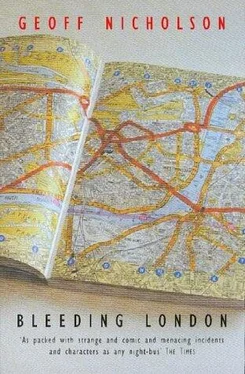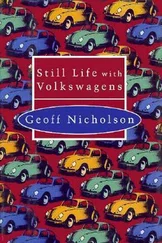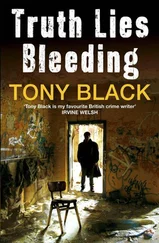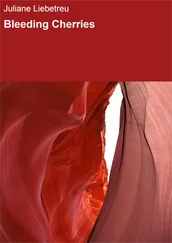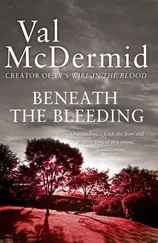“Please,” Judy said brightly, “I’d like you to look at my body.”
“Aren’t we getting a little ahead of ourselves?” asked the therapist.
“No, no,” said Judy. “Please look.”
Before the therapist could protest further Judy had stripped naked and was showing her body, revolving on the spot so the therapist could get a full, rounded view. It was immediately obvious that there was a strange serpentine marking curled around Judy’s torso. At a first glance it appeared to be a kind of bruising, but it would have been a strange kind of injury that created such a long, thin, continuous and precise bruise. The therapist looked more closely and saw that in another way it was rather more like a rash, a series of dark-blue spots that linked together to form a long, unbroken line. But again it was the wrong shape for any kind of rash she’d ever seen. For a moment she wondered if it wasn’t a series of cuts and cigarette bums, something self-inflicted, but knowing Judy Tanaka as she did she thought that surely couldn’t be.
Then Judy began to point out certain features of the mark, how it meandered in certain places, how in one place it formed an almost ninety-degree bend. “Much as the River Thames does at the Embankment,” she said archly.
And as the therapist looked more closely she saw that there was indeed something strangely familiar about the shape and design of the mark. Judy continued pointing to various parts of it and said, as though she were a tour guide, “Here we see Chelsea Harbour, here Battersea Reach, here the Isle of Dogs, and here the Upper and Lower Pool…” And before long the therapist was utterly convinced. The rash or bruise or scar or whatever it was formed a perfect representation of the River Thames, a depiction so accurate, so detailed, that you could have used it as a navigational aid.
The therapist reached out a hesitant index finger and ran it along the line of the mark.
“Does that hurt?”
“Not at all,”Judy said. “It’s rather nice actually.”
The therapist’s finger moved further along the map made flesh, from the source on Judy’s left leg, up her flank, across her soft, powdered belly, up towards her breasts, then widening out as it curled behind her back.
“Judy,” the therapist said quietly. “I can see we may need more sessions than I first thought.”
She likes the smell of burning wattle in the morning. She has swept in from the east, from the big skies and the waterlands, with her armies and her allies. She comes fresh from humiliation, deposed, stripped of her birthright and inheritance, beaten like a slave, her daughters raped by Roman soldiers. She has come to the doomed town to do her worst, to enjoy the smell of burning wood and thatch and human flesh, to reduce Londinium to embers.
Perhaps her revenge will not be so very sweet. The Roman governor, Gaius Suetonius Paullinus, moving before her, has done his best to reduce the mayhem. Ahead of the certain destruction, he has urged the population to evacuate the town. This is, after all, no military stronghold, no capital. There are no fortifications here, simply a narrowing of the river, a crossing, a place of trade and exchange, a settlement not more than ten years old.
Paullinus knows he cannot defend the undefended, and so has decided to make a sacrifice, but he hopes it will be a sacrifice of buildings not of bodies. He leaves with as many of the population as he is able to convince of their imminent fate. They move slowly with all their belongings, their furniture, their bed linen, the tools of their trades, all their transportable wealth.
Perhaps therefore when Boadicea arrived in Londinium she entered a wholly deserted place, took possession of a void, cold winds playing through the empty market place, nothing but rats in the abandoned grain stores. Yet even so, as she rides along the untended jetties, as her men search the cleared warehouses and workshops and abandoned former dwellings, she already knows she must destroy all this and much else besides.
Or perhaps, after all, the governor was not so persuasive as he would have liked to be. No doubt there were some stragglers, the sick, the old, the proud, the recalcitrant. These few remaining inhabitants are driven into the streets and easily, if baroquely, massacred. Yet destruction demands more than simple death. All those things that speak of ease and comfort, domestic things like bowls, jugs, lamps, glassware, little markers of civilization, all are smashed, crushed, pulverized, made nothing.
Those things that cannot be so easily destroyed must be purified by fire. Wood and straw is torched, makes excellent kindling. Twisters of black and grey smoke ascend from the comers of the town, rising above the crumbling, infirm buildings. Roofs are consumed, walls fall in on themselves. A great furnace of air burns at the centre, a core of heat that sucks breath from the earth.
Boadicea watches and approves. It is a job well done. After the flames comes the Iceni winter. She sniffed the thin, blackened air. She and her armies re-group, see what they have done, and head for Verulamium, for more of the same. And when she has done her worst she will kill herself, take poison rather than face capture and humiliation.
The settlement dies, becomes the home to charcoal and ashes. It returns to a time before Rome, before empire, before Caratacus came here. London becomes its former self, a humble river crossing set amid marshland and sandbanks. Boadicea will be remembered here. Future archaeologists slicing through the sedimentary crust of London history will recognize a layer of red earth, the ashes she left behind.
Later, very much later, in 1856, Thomas Thorneycroft begins his statue of Boadicea, with her daughters, her horses and her chariot. It is a grand, heroic extravagance in bronze; confident, profoundly English, and yet, one might argue, profoundly anti-imperialist. It was not unveiled until 1902.
Later still, it is situated in the elbow of Victoria Embankment and Westminster Bridge, and groups of the more curious sort of tourist surround it, stare up at the wild, solid figures and suggest to each other that it must be a depiction of Queen Victoria.
And finally here comes Stuart London, a London walker if not the London walker, conducting a party of Japanese money men round an eccentric, bite-size approximation of tourist London in preparation for their native theme park aspirations. In the years ahead he will learn to understand and respect and even admire Japanese business practices, but for the moment he wishes the members of the group didn’t seem quite so indistinguishable from each other, didn’t look quite so much like small suit-wearing tenpins.
He has told them that Boadicea is buried under platform eight of King’s Cross Station, and they found that a very good joke. Now he gazes up at the statue of her, at her raised arms, her flowing metal tunic. He looks into the face, surprisingly sensitive for a warrior queen, and is pleased to conclude that she doesn’t look a bit like Anita.
EOF
